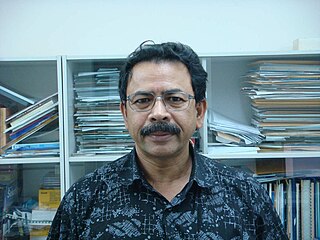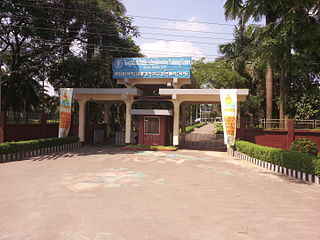Related Research Articles

Bangladesh, officially the People's Republic of Bangladesh, is a country in South Asia. It is the eighth-most-populous and among the most densely populated countries, with a population of around 200 million in an area of 148,460 square kilometres (57,320 sq mi). Bangladesh shares land borders with India to the west, north, and east, and Myanmar to the southeast; to the south it has a coastline along the Bay of Bengal. It is narrowly separated from Bhutan and Nepal by the Siliguri Corridor; and from China by the Indian state of Sikkim in the north. Dhaka, the capital and largest city, is the nation's political, financial and cultural centre. Chittagong, the second-largest city, is the busiest port on the Bay of Bengal. The official language is Bengali.

Dhaka, formerly known as Dacca, is the capital and largest city of Bangladesh. It is the ninth-largest and seventh-most densely populated city in the world. Dhaka is a megacity, and has a population of 10.2 million residents as of 2022, and a population of over 22.4 million residents in Greater Dhaka. It is widely considered to be the most densely populated built-up urban area in the world. Dhaka is the most important cultural, economic, and scientific hub of Eastern South Asia, as well as a major Muslim-majority city. Dhaka ranks third in South Asia and 39th in the world in terms of GDP. Lying on the Ganges Delta, it is bounded by the Buriganga, Turag, Dhaleshwari and Shitalakshya rivers. Dhaka is also the largest Bengali-speaking city in the world.

Bangladesh University of Engineering and Technology, commonly known by the acronym BUET, is a public technological research university in Dhaka, Bangladesh. Founded in 1876 as the Dacca Survey School and gained university status in 1962, it is the oldest institution for the study of engineering, architecture, and urban planning in Bangladesh.

Independent University, Bangladesh or IUB is a private university in Bangladesh. It is located in Bashundhara Residential Area of Dhaka, Bangladesh. It was established in 1993 under the Private University Act, 1992. IUB has 10,000 students, 11,556 alumni, and 401 faculty members. The campus is spread over three and a half acres and is equipped with an amphitheater, a library, laboratories, and more than 120 classrooms. The Independent University has academic research collaborations with a number of universities including Harvard University, Stanford University, and the University of Colorado at Boulder.

Rehman Sobhan is a Bangladeshi economist. Regarded as one of the country's top public thinkers, he is the founder of the Centre for Policy Dialogue. Sobhan is an icon of the Bangladeshi independence movement due to his role as a spokesman of the Provisional Government of Bangladesh in the United States during the Bangladesh Liberation War. He was awarded the Independence Day Award, Bangladesh's highest civilian honour, in 2008.

Islamic University, Bangladesh commonly referred to as Islamic University, Kushtia shortly IU, is a public PhD granting research university in Kushtia, Bangladesh and the largest seat of higher education in the south-west part of the country. It is the only university in Bangladesh where a specialized stream of Theology and seven others academic divisions/faculties: Engineering and Technology, Humanities, Social Sciences, Sciences, Biological Sciences, Business Administration and Law are running parallel in a multicultural atmosphere. It is financed by the Government of Bangladesh through University Grants Commission, Bangladesh. On 22 November 1979, the foundation of the Islamic University was set up in Kushtia, and it is operated under the Islamic University Act of 1980. Islamic University began operations on 28 June 1986. It is the seventh oldest university in the country and the first university in Bangladesh established after the independence from Pakistan in 1971. It offers undergraduate, graduate, M Phil and PhD degrees.

Agriculture is the largest employment sector in Bangladesh, making up 14.2 percent of Bangladesh's GDP in 2017 and employing about 42.7 percent of the workforce. The performance of this sector has an overwhelming impact on major macroeconomic objectives like employment generation, poverty alleviation, human resources development, food security, and other economic and social forces. A plurality of Bangladeshis earn their living from agriculture. Due to a number of factors, Bangladesh's labour-intensive agriculture has achieved steady increases in food grain production despite the often unfavorable weather conditions. These include better flood control and irrigation, a generally more efficient use of fertilisers, as well as the establishment of better distribution and rural credit networks.

Ralf Reski is a German professor of plant biotechnology and former dean of the Faculty of Biology of the University of Freiburg. He is also affiliated to the French École supérieure de biotechnologie Strasbourg (ESBS) and Senior Fellow at the Freiburg Institute for Advanced Studies.

The Bangladesh University of Professionals is a Public University in Bangladesh, located in Mirpur Cantonment, Dhaka. It is the 31st public university of Bangladesh affiliated with University Grant Commission. It was established under the Bangladesh University of Professionals Act, 2009.

Saleemul Huq is a Bangladeshi-British scientist and has been the Director of the International Centre for Climate Change & Development (ICCCAD) based in Bangladesh, also Professor at Independent University, Bangladesh (IUB). He was elected one of Nature's 10 Ones in 2022.

Martha Chen is an American academic, scholar and social worker, who is presently a lecturer in public policy at the Harvard Kennedy School and senior advisor of the global research-policy-action network WIEGO and a member of the Advisory Board of the United Nations University World Institute for Development Economics Research (UNU-WIDER). Martha is a development practitioner and scholar who has worked with the working poor in India, South Asia, and around the world. Her areas of specialization are employment, poverty alleviation, informal economy, and gender. She lived in Bangladesh working with BRAC, one of the world's largest non-governmental organizations, and in India, as field representative of Oxfam America for India and Bangladesh for 15 years.

Shah Mohammad Faruque is a professor in the School of Environment and Life Sciences at Independent University Bangladesh (IUB). He is widely recognized for his research in Vibrio cholerae, the bacterium which causes the epidemic diarrhoeal disease Cholera. Among other positions, previously he was a professor at BRAC University; director of the Genomics Centre at the International Centre for Diarrhoeal Disease Research, Bangladesh (ICDDR,B), and formerly director of the Centre for Food and Water Borne Diseases in ICDDR,B. His areas of research interest include microbial genomics, bacteriophages, environmental microbiology, ecology, and evolution of bacterial pathogens, particularly those associated with waterborne and foodborne diseases. Faruque is primarily known for his work in genomics, epidemiology and ecology of the cholera pathogen, and its bacteriophages.

Climate change in Bangladesh is a critical issue as the country is one of the most vulnerable to the effects of climate change. In the 2020 edition of Germanwatch's Climate Risk Index, it ranked seventh in the list of countries most affected by climate calamities during the period 1999–2018. Bangladesh's vulnerability to the effects of climate change is due to a combination of geographical factors, such as its flat, low-lying, and delta-exposed topography, and socio-economic factors, including its high population density, levels of poverty, and dependence on agriculture.

The College of Natural Resources, Royal University of Bhutan is a college offering courses on natural resources management, that include organic agriculture, animal science, environment and climate, food science and technology, forest science and sustainable development The college is located in Lobesa, Punakha District, in central west Bhutan. The college campus is spread over 98 acres (40 ha) on the eastern slope of Lobesa and is about 140 km (87 mi) away from the Paro International Airport.

Bangladesh Public Administration Training Centre (BPATC) is a training institute for the public sector. It was founded in 1984, and is situated in Savar, Dhaka District. It has teaching facilities, quarters for the officers, a mosque, and a lake. Md Ashraf Uddin is the rector of the Bangladesh Public Administration Training Centre.

ARTDOC is a research-oriented formation in the Bangladesh Army. It is headquartered at Momenshahi Cantonment, Mymensingh. It is charged with overseeing training evaluation and reforms; weapon, equipment and force modernization; development of concepts and doctrine revision. It consists of its headquarters, battle group and all the training institutions of the Bangladesh Army. The first General Officer Commanding of ARTDOC was Major General Muhammad Zia-Ur-Rahman, ndc, psc,

Bashundhara Residential Area is an upscale residential and semi-business neighbourhood in Dhaka, Bangladesh. The area is developed by Bashundhara Group.

Lingadahalli Subrahmanya Shashidhara, currently the Centre Director of National Centre for Biological Sciences, Bengaluru, India, is an Indian developmental biologist, geneticist and a professor of biology. He is a Professor at the Indian Institute of Science Education and Research, Pune, and at Ashoka University, Sonepat, India.[3]. He heads the LSS Laboratory at IISER and is known for his studies on Drosophila, particularly Evolution of appendages and functions of homeotic selector genes. He is a J. C. Bose National Fellow of the Department of Science and Technology and an elected fellow of the Indian National Science Academy, Indian Academy of Sciences and the National Academy of Sciences, India. The Council of Scientific and Industrial Research, the apex agency of the Government of India for scientific research, awarded him the Shanti Swarup Bhatnagar Prize for Science and Technology, one of the highest Indian science awards, in 2008, for his contributions to biological sciences.

The Government agencies in Bangladesh are state controlled organizations that act independently to carry out the policies of the Government of Bangladesh. The Government Ministries are relatively small and merely policy-making organizations, allowed to control agencies by policy decisions. Some of the work of the government is carried out through state enterprises or limited companies.
References
- ↑ "Institute of Development Studies: International Centre for Climate Change and Development page". Archived from the original on 5 September 2017. Retrieved 5 September 2017.
- ↑ Vidal, John (2 September 2017). "As flood waters rise, is urban sprawl as much to blame as climate change?". The Guardian. ISSN 0261-3077 . Retrieved 7 September 2017.
- ↑ "Our Team". International Centre for Climate Change and Development. Retrieved 5 March 2018.
- ↑ "BACS". Bangladesh Academy for Climate Services launched. Retrieved 25 July 2019.